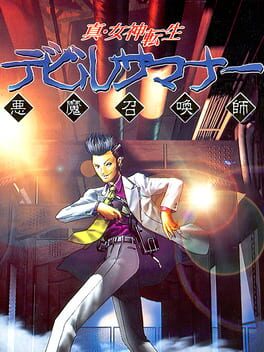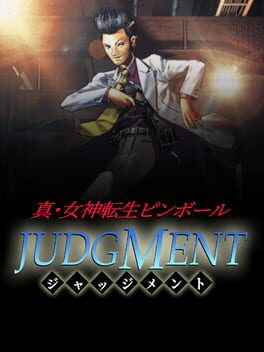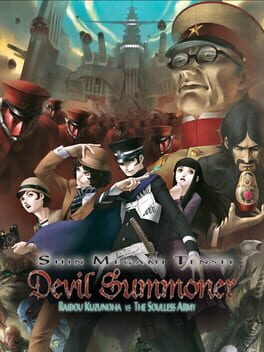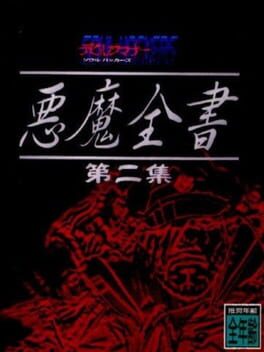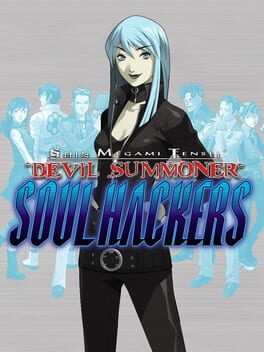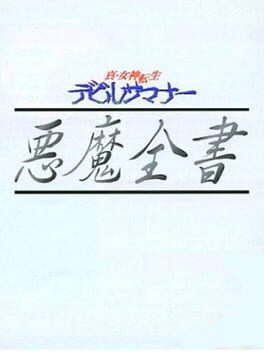

This is the original 1995 Devil Summoner game on the Sega Saturn and was released only in Japan. It was later ported to PSP in 2005. Abandoning the post-apocalyptic themes of the original series, the story takes place in modern Japan. The player character is an unnamed college student who is attacked by demons along with his girlfriend; they are saved by the timely appearance of a suave demon-hunter named Kyouji. Shortly thereafter, Kyouji is found dead under suspicious circumstances. The protagonist is then trapped inside of a warehouse and murdered by a deranged killer named Sid. Rather than stay dead, the player finds himself in the reanimated body of the slain Kyouji, and escapes from the morgue. With the help of Kyouji's voice, which guides the player from inside his head, the main character joins up with Kyouji's female partner Rei in order to save the life of his girlfriend, who is still in danger.
Also in series
Released on
Genres
Reviews View More
Devil Summoner tells the story of you, a college student who is hanging out with his girlfriend one day. You go get some weird book from the library when you then split up to get some tickets from a ticket office for a concert later that week (the pre-internet purchasing days were a WILD time, huh?), only to find it full of blood-thirsty demons. You're saved from certain death by a mysterious but arrogant man who introduces himself as Kyouji Kuzunoha, a devil summoner and private investigator. Upon leaving the building, you're stopped by a man named Sid. A strangely dressed foreigner who nonetheless has pretty good Japanese, who teleports you into a building with no escape as he demands you hand over the book you checked out earlier (your girlfriend forgot her library card, so it was checked out under your name), and upon learning you don't have it, he kills you. Charon awaits you at the River Styx, but tells you it not only isn't your time yet, but you also can't go back to your body, so upon being sent back you wind up in the body of the recently deceased... Kyouji Kuzunoha, and a new devil summoner is born!
That's only the first twenty or thirty minutes of the plot (explained in perhaps a bit more detail than needed), but I'm going to such lengths to try and get across just how much more emphasis on characters and dialogue are present in this story compared to prior SMT games. Despite how story-focused the three SFC games are, they don't really have THAT much text (certainly not story-important text) compared to many contemporary JRPGs. The jump from the Super Famicom to the Saturn almost feels like the jump from the Famicom to the Super Famicom in regards to just how much more story is here.
It's got a bunch of silly and/or interesting characters (from the James Bond villain-like gun store owner to your ever skeptical investigation partner Rei), but the main story isn't really all that deep. It's an engaging mystery to figure out just what's going on with Sid and the appearances of all the demons, sure, but there's not really character arcs going on here. It's more like a blockbuster thriller film, where the events and how they happen are more interesting than the actual deeper beliefs of the characters in the narrative. To give credit where credit is due, the main theme of the story being about how the higher escalations of society (both legitimate and illegitimate) more often work together to the benefit of themselves and the expense of all us normal people is done well. Just outside of the modern setting, that theme isn't exactly terribly unique among JRPGs from the 90's. It's a well done story with charming dialogue that I enjoyed my time with, but it's not exactly setting the world on fire.
The mechanics of the game are still very recognizably SMT, as you go through dungeons in first-person and have random battles with demons whom you recruit via negotiations and can fuse into more powerful demons (with some retaining skills from whom they were fused by). You also still put a point into a single stat (strength, intelligence, magic, vitality, speed, or luck) upon leveling up instead of getting general stat boosts. It's simultaneously a further polishing of the non-Persona-y parts of SMT IF (no guardian-spirits, thank heck). Returning from SMT IF, we have mechanics such as no aligment due to narrative choices, and your alignment only being a factor of the balance of demons in your group (law ones don't wanna be with chaos ones and vice versa). The narrative is actually completely linear now. Another few mechanics are the inability to use melee from the back row (although some spear weapons do allow that now), and how guns have limited bullets (although you can buy them MUCH faster now and running out of them is never really a problem, as they have stacks of 999 now). The entire inventory system has been super improved, really, as you can carry 30 of normal items and those massive bullet stacks in a nearly (but not actually) unlimited space inventory.
Speaking of improved features, the dungeon and overall game design are definitely among them. With the exception of the town hall (which I'd call easily the hardest dungeon in the game), all of the dungeons are of very reasonable length and have very reasonable trap design. You'll never have a truly hellish or unreasonable massive labyrinth of darkness, teleporter mazes, or pitfalls (at least not nearly to the degree the previous games do). Dungeons also have much more detailed looks to their graphics now, and it's actually much easier (although not all the time) to use visual landmarks to find your way around without constantly referring to the auto-mapping tool. Money and magnetite (the resource you need to maintain having demons summoned) are still here, but I never had a problem having enough of either, thankfully, and usable items are cheap and easily bought in the shops. You can even get an item (although only one at a time) that lets you save anywhere outside of battle, which makes retrying difficult bosses WAY easier. Getting sniped by a stray instant-death spell is still a danger, but there's even late-game equipment you can find to be totally immune to instant death, which is certainly more than the other SMT games up to this point could say XD. The overall difficulty with both the dungeons and bosses are really well tuned, and this is actually a game in the series I could recommend to non-SMT fans who just like JRPGs and confidently believe that they could finish it without getting too frustrated.
The biggest changes, however, are in regards to demons and how battle itself works. Some of these changes are good, but some of them are on the more not so good end. On the good end, we have a total rework to how combat works. You can still talk to demons to negotiate with them, and this is definitely my favorite way demon negotiation has been since they got rid of the simpler (and better :b) system that SMT 1 used. You need high enough intelligence to get them to get on your side (I found 15 to be a good amount), but there's a good mix of conversation and randomness to how they talk with you. However, the important thing here is how they appear in battle. They are now much more like contemporaries like Dragon Quest in that you just have an assortment of demons in front of you, and what you literally see is what you're fighting. Gone are the systems of the previous 5 games of only fighting one or two types of enemies who have 1~8 members of their species with them, and this much more standard system works much better. It may not be unique, but it just works better and makes battles go more quickly (although the auto-battle system actually goes much more slowly now so you can more easily see what is happening to whom and why).
But it's about time I addressed the big, cranky, uncooperative elephant in the room: Demon Loyalty. Anyone who knows of this game's sequel, Soul Hackers, (which was actually localized on the 3DS), will likely be extremely aware of the new mechanic of demon loyalty. No longer will demons simply do as they're told. There are 10 ranks of loyalty they can have, and if they're more loyal they'll do what you tell them, and if they're less loyal, they're more likely to disobey (or it may be impossible to even give them any kind of specific instructions at all). Depending on the personality they have, they'll prefer doing different commands, and you can buy them alcohol or give them gems to make them more loyal. However, even perfectly loyal demons (including your man-made demon Zouma) do sometimes disobey, meaning you can never perfectly rely on anyone but yourself and your human partner to do things exactly as needed.
This IS a huge pain in the butt, but the game is actually forgiving enough (for an SMT game, anyhow) that this doesn't need to be a huge problem if you play around your demon's whims. The way I played, I just got demons who tended to do a certain thing with their minimum loyalty behavior that suited my purposes. Tough front line guys with few spells to fruitlessly spam who will wail away at targets in front of me, and back-row healers and support characters to help out if they feel like it. And demons are thankfully pretty smart even when they're not being told what to do, and will often heal or do buffs or de-buffs if they think they should. I was routinely surprised at just how eager (sometimes over-eager) they were to heal a hurt party member even with me never telling them to. While the demon loyalty system is definitely not a plus side of Devil Summoner, I was pleasantly surprised at how it is so easily not really a negative either.
Presentation is really nice for a game released around the Saturn's first birthday. Sure, there's no bells and whistles like voice acting, and there's only a couple of animated cutscenes (which use really old 3D pre-rendered footage and often look very retro and/or funny XD), but the 2D and 3D both look quite good. The 2D sprites used for demons, humans, and portraits all look very nice with the art style, and the 3D environments both look nice and are well-detailed enough to make finding your way around a lot easier (as mentioned before). The music is also really good. With a lot of more upbeat and pumping tracks in addition to atmospheric ones, this is the first SMT game with a soundtrack I genuinely really enjoyed.
There are some bugs and performance issues, but nothing major. When turning in the first-person mazes, screen tearing happens pretty darn often. It didn't bother me, but it's certainly the graphical issue I felt was most worth mentioning. Bugs are significant, but often not horrible. In the original (but not the special box edition re-release) version that I played, raising Kyouji's speed above 25 will make his speed glitch out and make him nearly always go last. Now speed is still a super valuable stat for how it increases defense, accuracy, and evasion, and there's actually a fair bit of utility in Rei almost always going first and Kyouji so reliably going last, but it's still annoying. The game also has some issues with certain negative status effects never triggering. I never once saw things like SHOCK or FREEZE actually work for either me or the enemy despite both the game and manual insisting they exist. The game also apparently has level drain, but I never once ran into it (thank heck). That all adds up to the game ultimately being more forgiving and fun, as the game is already plenty hard without that stuff, but it's definitely all stuff worth keeping in mind as you play.
Verdict: Recommended. This game certainly has its shortcomings, but I really enjoyed my time with it. It's easily my favorite SMT game I've played so far, and one I definitely recommend. It's a little ironic that this is one of the only mainline games in the extended series to never be officially or unofficially localized, but if it does get translated or you can read enough Japanese to play it, this is definitely a JRPG worth checking out on the Saturn, even if you aren't otherwise a huge fan of SMT.
